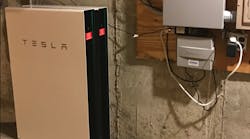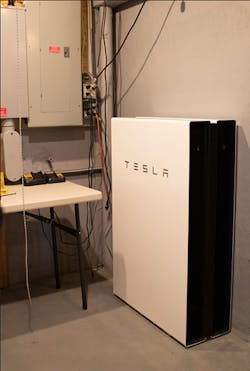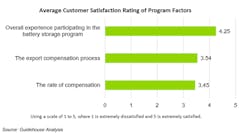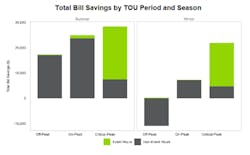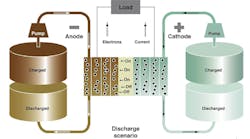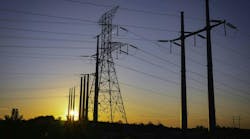The traditional business model regulated electric utilities have employed for decades is evolving as technologies change to meet customers’ needs, and Liberty – New Hampshire is leading the way. The local, regulated electricity, water, and natural gas utility provides services to over 1 million customer connections, primarily in North America, with a growing portfolio of clean, renewable wind, solar, hydro and thermal power generation facilities represent over 4 GW of renewable generation capacity in operation and under construction. A forward-thinking, local, regulated electric distribution company, In 2018 Liberty - NH launched a pilot battery storage program and customers who took the plunge are gaining the rewards.
The Changing Need
It’s important to emphasize that to meet the changing needs of customers and continue to provide value, electric utilities now need to offer customers a suite of solutions to address their complex and varying energy needs. Rather than electric utilities continuing to simply sell customers more electricity, they must understand and support their customers’ goals of reducing electricity use, managing costs, and obtaining electricity from an array of environmentally friendly sources.
Understanding customers’ service expectations is also important and at the forefront of changing customer needs. Today’s companies can provide experiences beyond those offered by a traditional electric utility. With the advent of companies like Amazon, where customers can order a product with a single click and receive it in 24 hours, or Netflix, where driving to the movie rental store is a thing of the past, customers expect the same immediate attention to their questions or concerns from their utility.
Electric utilities must address these emerging customer needs or risk being left behind. Customers’ desire for a more responsive and interactive power system increases the importance of investment in a modern and flexible distribution system, which can manage loads, provide real-time information, and interconnect distributed generation sources in multiple locations.
Meeting The Need
Liberty’s battery storage program, conceptualized in 2017 and launched in 2019, allowed Liberty to test a first-of-its-kind home battery storage project. Liberty would own 500 Tesla Powerwall batteries that would be installed as part of a small pilot of customers in Liberty’s electric territory in New Hampshire. The plan was simple -- batteries would charge overnight when electric demand and rates were low and power on during times of high demand or if there was a power outage.
The goal was even more simple -- to power customer’s homes in a more affordable manner. A benefit Liberty hoped to experience was decreased demand on the grid, which would mean lower costs for all customers.
In 2017, when Liberty first filed for approval of a battery storage pilot, the goals set forth were to reduce peak load at ISO New England during peak hours, provide battery backup during power outages, and offer customers time-of-use (“TOU”) rates to allow them to learn more about their energy usage and better manage it. The New Hampshire Public Utilities Commission (NHPUC) approved the pilot as two phases in 2019.
Phase 1 allowed 100 customers to receive two Tesla Powerwalls in their homes. Tesla crews install the Powerwalls and were chosen through an RFP process, which offered Liberty the best install price and will service any battery-related issues.
Battery installations commenced in mid-2020 with dispatch during peak hours starting in September 2020. All customers with the batteries have access to a phone app that gives real time data if they have a smart phone.
As part of the agreement with the NHPUC, a successful Phase 1 pilot would deliver peak demand reduction by dispatching the batteries with an accuracy of 75% or greater, provide cost savings for costs incurred for transmission charges equal to or greater than those projected in the initial analysis, and demonstrate the investment necessary to implement both phases have a positive net present value (“NPV”) after updating initial assumptions with the most recent actual or projected values.
The Results
During Phase 1, the average monthly coincident peak performance was 79%, and annual coincident peak performance was 81%, both exceeding the target of 75%. The direct comparison of projected, annual, and adjusted benefits in Phase 1 provided for adjusted savings in transmission costs and avoided capacity costs of $181,351 or $9,413 more than the initial projections with an actual NPV of 0.99. Additionally, the customers participating in the pilot saved an average of 33%, or $60 on their monthly bills.
What’s Next?
Liberty intends to continue this program and has proposed a second phase, which includes the rental of an additional 300 batteries in 150 customer homes, a Bring Your Own Device (“BYOD”) aspect allowing customers who may already have storage to participate in the pilot, and the opportunity to study vehicle-to-grid prospects.
Our customers are at the core of each decision we make, and we are proud to offer innovative programs and support choice for them. Going forward, we will continue exploring options that allow us to better serve our customers and their energy needs.
To learn more about Liberty’s battery pilot program, visit libertyenergyandwater.com.
Heather Tebbetts is director of business development for Liberty New Hampshire, a subsidiary of Ontario-based Algonquin Power & Utilities Corp. Liberty serves approximately 43,000 electric customers in New Hampshire. Heather graduated from Franklin Pierce University in 2004 with a Bachelor of Science degree in Finance. She received a Master’s of Business Administration from Southern New Hampshire University in 2007. She worked for Eversource Energy from 2004 through 2014. In 2014, she joined Liberty Utilities in their Rates and Regulatory Affairs department and was promoted to Director of Business Development in 2022. She has extensive experience in grid modernization, net metering policy, and rate cases.
